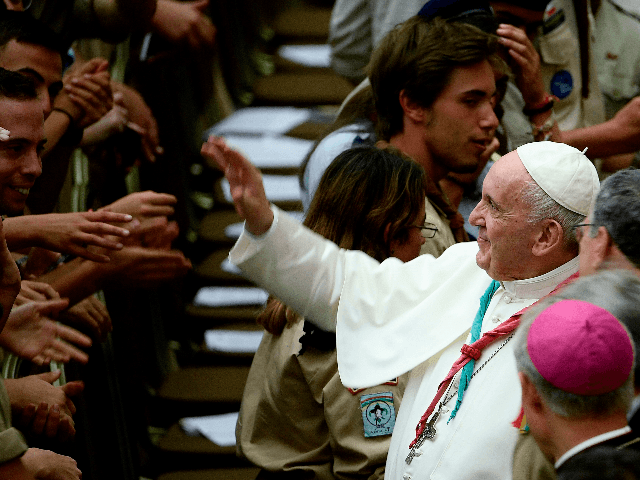ROME — Pope Francis said that citizens of European nations should put the good of Europe before that of their own countries in a remarkably frank interview Friday.
“The thinking must be ‘Europe first, then each one of us,’” the pope said in a wide-ranging interview with the Italian daily La Stampa. “‘Each one of us’ is not secondary, it is important, but Europe counts more.”
“Never forget that ‘the whole is greater than the parts.’ Globalization, unity, should not be conceived as a sphere, but as a polyhedron: each people retains its identity in unity with others,” he said.
“In the European Union, we must talk to each other, confront each other and get to know each other. Yet sometimes we see only compromise monologues. No: we also need to listen,” he said.
The pontiff made no attempt to conceal his contempt for the policies of Italy’s interior minister, Matteo Salvini, whose motto has been “Italians first.” Francis even went so far as to compare Salvini’s speeches to those of Adolph Hitler.
“Sovereignism” — the movement spearheaded in Italy by Mr. Salvini — reveals “an attitude toward isolation,” the pope said. “I am concerned because we hear speeches that resemble those of Hitler in 1934. ‘Us first, We…We…’ These are frightening thoughts.”
“Sovereignism means being closed,” the pope continued. “A country should be sovereign but not closed. Sovereignty must be defended, but relations with other countries and with the European community must also be protected and promoted.”
“Sovereignism is an exaggeration that always ends badly: it leads to war,” he said.
When asked about populism, the pope said that it is basically the same thing as sovereignism.
“It is one thing is for people to express themselves, and another is to impose a populist attitude on the people,” he said. “The people are sovereign (they have their way of thinking, feeling, evaluating, and expressing themselves), while populist movements lead to forms of sovereignism. That suffix, ‘ism’, is never good.”
In his interview, the pope also seemed to embrace popular notions that Europe and the European Union (EU) are virtually the same thing, so that to weaken the EU is to weaken Europe.
“Europe cannot and must not break apart. It is a historical, cultural as well as a geographical unity,” Francis said. “The dream of the Founding Fathers had substance because it was an implementation of this unity. Now, we must not lose this heritage.”
“This unity has weakened over the years, partly because of administration problems and internal disagreements. But it must be saved. After the elections, I hope that a process to relaunch it begins and continues without interruption,” he said.
The pope also expressed his admiration for the new President of the European Commission, Ursula von der Leyen, saying he was pleased with the appointment of the former German defense minister to the post.
“A woman can be the right person to revive the strength of the Founding Fathers,” the pope said of the Angela Merkel protégée. “Women know how to bring people together, unite.”
Von der Leyen sprang into public view in 2016 with her push for European military integration, perceived by many to have been one of the key issues that pushed the British people toward Brexit.
Von der Leyen warned the United Kingdom against opposing further military federalization, the establishment of a single EU army, navy, and air force.
Earlier this year, she declared that the EU army was “already taking shape.”

COMMENTS
Please let us know if you're having issues with commenting.